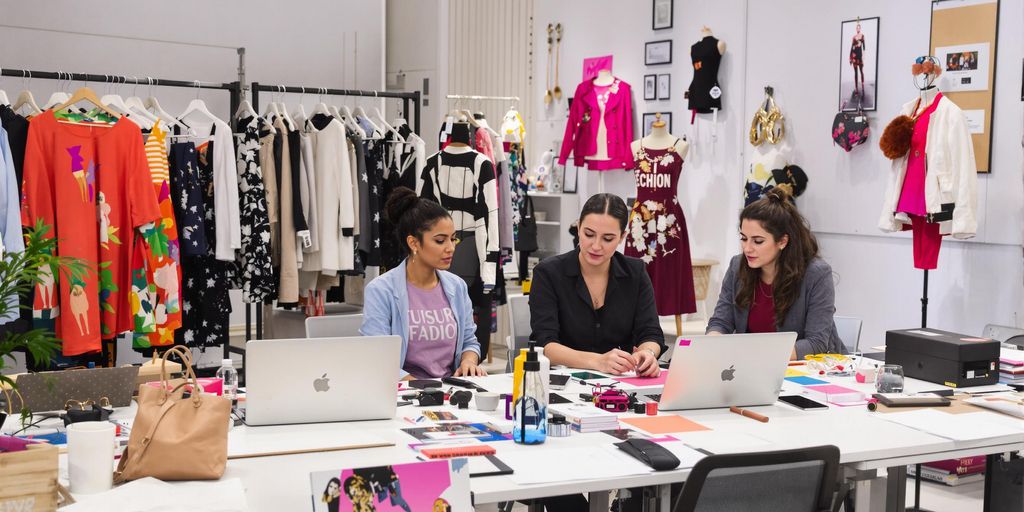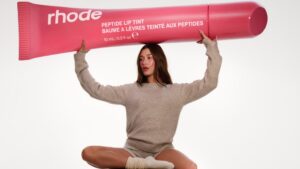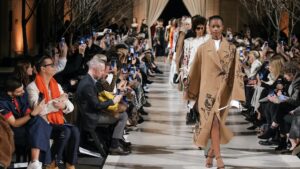Ever wondered what it’s like to work in fashion marketing? It’s more than just creating ads or running social media campaigns. This career blends creativity and strategy to connect brands with their audiences. If you’re looking to break into the fashion industry, marketing could be your way in. Let’s explore the different paths, skills, and opportunities that make this field so exciting.
Key Takeaways
- Fashion marketing is about connecting brands with consumers through creative strategies.
- A degree in fashion marketing can open doors to various roles, from social media management to brand strategy.
- Internships provide real-world experience, making you stand out to potential employers.
- Digital tools and platforms are essential for success in today’s marketing landscape.
- Networking and staying informed about industry trends are crucial for career growth.
Understanding the Role of Marketing in the Fashion Industry
The Importance of Fashion Marketing
Fashion marketing isn’t just about selling clothes; it’s about connecting with people. It plays a critical role in shaping how consumers perceive brands and products. By understanding trends and consumer behavior, marketers help fashion brands stay relevant in a fast-changing industry. For example, fast fashion brands boost visibility by constantly introducing new styles, encouraging frequent purchases. This strategy keeps their audience engaged and loyal.
How Marketing Bridges Brands and Consumers
Marketing acts as a bridge between fashion brands and their customers. Through campaigns, social media, and storytelling, marketers create emotional connections that go beyond the product itself. A well-crafted campaign can turn a simple outfit into a symbol of empowerment or individuality. This connection often drives customer loyalty, leading to long-term success for brands.
Key Responsibilities of Fashion Marketers
Fashion marketers wear many hats. Some of their core tasks include:
- Market Research: Analyzing trends, competitors, and consumer preferences.
- Campaign Development: Crafting advertisements and promotions that resonate with target audiences.
- Digital Engagement: Managing social media platforms and online presence to keep the brand visible and relevant.
A skilled fashion marketer knows how to balance creativity with data-driven strategies, ensuring campaigns not only look good but also deliver results.
Educational Pathways for Aspiring Fashion Marketers
Bachelor’s Degree Programs in Fashion Marketing
A bachelor’s degree in fashion marketing is a great way to begin your journey into this dynamic field. These programs often combine courses in marketing principles, consumer behavior, and brand management with a focus on the fashion industry. It’s a solid foundation for understanding how to connect products with the right audience.
Key elements of a typical bachelor’s degree program include:
- Classes on digital marketing, social media strategies, and retail management.
- Opportunities for internships with major fashion brands.
- Exposure to both creative and analytical aspects of marketing.
Master’s Degree Specializations in Digital and Strategic Marketing
For those looking to advance their expertise, master’s programs offer specialized training in areas like digital media marketing and strategic planning. These programs are often shorter, typically around one year, but provide in-depth knowledge and practical skills.
Some benefits of pursuing a master’s degree:
- Tailored specializations to suit your career goals.
- Advanced coursework in data analytics, omni-channel marketing, and consumer insights.
- Access to a network of industry professionals and alumni.
The Value of Internships in Fashion Marketing Education
Internships are indispensable for gaining real-world experience. Many fashion marketing programs integrate internships as part of the curriculum, allowing students to apply their classroom knowledge in professional settings.
Here’s why internships matter:
- They help build your résumé with relevant experience.
- Offer a chance to network with industry insiders.
- Provide a clearer understanding of the day-to-day responsibilities in marketing roles.
Internships not only open doors to potential job opportunities but also boost your confidence in navigating the fashion marketing world.
Diverse Career Opportunities in Fashion Marketing
Entry-Level Roles in Fashion Marketing
Starting in fashion marketing often means diving into roles that let you get your hands dirty with the basics. Many graduates begin as Marketing Coordinators, Social Media Assistants, or Public Relations Associates. These positions focus on tasks like creating content, scheduling campaigns, and managing relationships with media outlets. They’re your first step to understanding how brands connect with their audience.
Here’s a quick snapshot of common entry-level roles:
| Job Title | Key Responsibilities |
|---|---|
| Social Media Coordinator | Managing posts, analyzing engagement metrics |
| Marketing Communications Assistant | Writing press releases, assisting in campaigns |
| Public Relations Assistant | Building media lists, coordinating events |
Advanced Positions for Experienced Professionals
As you gain experience, the doors open to more strategic and managerial roles. Professionals often move into positions like Brand Strategist, Marketing Manager, or Advertising Campaign Manager. These roles demand a deeper understanding of consumer behavior and the ability to craft long-term strategies that align with a brand’s identity.
Some advanced positions include:
- Brand Strategist: Develops a brand’s voice and ensures it resonates with the target audience.
- Marketing Manager: Oversees campaigns and ensures they meet business objectives.
- Social Media Manager: Crafts overarching social media strategies and manages a team.
Exploring Niche Areas Like Luxury and Digital Marketing
Fashion marketing isn’t one-size-fits-all. Niche areas like luxury marketing and digital marketing offer specialized pathways. For instance, luxury marketing focuses on creating exclusive, high-end experiences for customers. Think of brands like Prada or Gucci; their marketing isn’t just about selling products—it’s about selling a lifestyle.
On the other hand, digital marketing is all about mastering online platforms. From running ads on social media to analyzing data trends, this area is growing fast. If you’re tech-savvy and love numbers, this could be your calling.
Fashion marketing careers are as diverse as the industry itself. Whether you’re drawn to luxury, digital, or traditional roles, there’s a place for every skill set. Start small, aim big, and let your interests guide the way.
Essential Skills and Tools for Success in Fashion Marketing
Analytical and Research Skills
Fashion marketing relies heavily on understanding trends, consumer behavior, and market demands. Developing strong analytical skills allows professionals to interpret data effectively, identifying what works and what doesn’t. Research skills are equally important, helping marketers uncover insights about their target audience and competitors. Knowing how to gather and analyze information is the backbone of decision-making in this field.
Key areas to focus on include:
- Market trend analysis
- Customer segmentation
- Competitor benchmarking
Mastering Digital Platforms and Tools
In today’s digital age, fashion marketers must be proficient with various platforms and software. From creating visually appealing campaigns to managing social media, these tools are indispensable. Digital tools not only make tasks easier but also amplify the reach and effectiveness of marketing strategies.
Some essential tools include:
| Tool | Purpose |
|---|---|
| Adobe Creative Cloud | Designing ads and campaigns |
| Hootsuite | Social media management |
| Microsoft 365 Suite | Workflow and collaboration |
Effective Communication and Brand Storytelling
The ability to tell a compelling story is what sets successful fashion marketers apart. Communication skills are crucial for articulating ideas, whether it’s pitching a campaign or developing content that resonates with consumers. A well-told story can transform a brand, making it memorable and relatable.
Here’s how to enhance your storytelling:
- Focus on authenticity to build trust.
- Use visuals and narratives that align with the brand identity.
- Engage with your audience through personalized content.
In fashion marketing, your success often hinges on your ability to connect emotionally with your audience. A great story can turn casual shoppers into loyal customers.
Building a Network and Staying Updated in the Fashion Marketing World
Joining Professional Organizations
One of the best ways to build connections in the fashion marketing world is by becoming a member of professional organizations. These groups offer not only networking opportunities but also access to industry events, workshops, and job boards. Consider joining organizations like the American Marketing Association (AMA) or the Social Media Marketing Society. These memberships can help you stay in the loop with the latest trends and connect with like-minded professionals.
Leveraging Industry Publications
Staying informed is key in a fast-moving industry like fashion marketing. Subscribing to respected publications such as Ad Age or Marketing Week can keep you updated on emerging trends and strategies. These resources provide valuable insights into consumer behavior, new technologies, and successful campaigns. Regular reading can help you sharpen your knowledge and stay competitive in the field.
The Role of Networking in Career Growth
Networking isn’t just about handing out business cards; it’s about building meaningful relationships. Start by attending industry events, fashion shows, and marketing conferences. You can also use platforms like LinkedIn to connect with professionals and join relevant online communities. Here are some tips to make the most of your networking efforts:
- Be genuine and show interest in others’ work.
- Follow up with new connections to keep the relationship alive.
- Offer value, whether it’s sharing an article or introducing someone to a contact.
Building a network takes time, but the relationships you cultivate today can open doors to opportunities tomorrow.
The Impact of Digital Transformation on Fashion Marketing Careers
The Rise of Social Media Marketing
Social media has completely changed how fashion brands reach their audience. Platforms like Instagram, TikTok, and Pinterest are now central to marketing strategies. Fashion marketers use these channels not just to advertise but to create communities around their brands. The ability to craft engaging content and respond quickly to trends is more important than ever. Short-form videos, influencer collaborations, and interactive campaigns are some of the tools driving success in this space.
Understanding Omni-Channel Consumer Behavior
Consumers today expect seamless experiences across both digital and physical spaces. For example, someone might discover a product on social media, try it in-store, and then purchase it online. This behavior means marketers need to think beyond just one platform or channel. Instead, they must integrate everything—from e-commerce sites to in-person events—into a unified strategy. Data analytics plays a big role here, helping brands understand how customers move between these touchpoints.
The Growing Importance of Data Analytics
Data is the backbone of modern fashion marketing. With the right tools, brands can track consumer preferences, predict trends, and personalize campaigns. This isn’t just about collecting numbers—it’s about interpreting them to make smarter decisions. Tools like Google Analytics, CRM software, and even AI are becoming standard in the industry. For marketers, knowing how to use these tools effectively can set them apart in a competitive job market.
Digital transformation isn’t just a trend; it’s reshaping the entire fashion marketing landscape. Professionals who adapt to these changes are the ones who will thrive.
Success Stories: Learning from Fashion Marketing Professionals
Insights from LIM College Alumni
LIM College has a track record of producing skilled fashion marketers who excel in diverse roles. Alumni like Lauren Gallo, Senior Director of Brand Marketing Creative at Nike, credit their success to hands-on coursework and real-world internships. Similarly, Brandon Smithwrick, now Head of Content at Kickstarter, reflects on how his internship at KITH gave him a unique edge in the industry. These stories highlight how practical experience can shape careers in fashion marketing.
Career Journeys in Global Fashion Brands
Many professionals in fashion marketing have carved out impressive careers at global brands. For instance, LIM graduates have secured positions like Social Media Manager at BLNY Media Group and Marketing Communications Manager at Accessories Council. These roles often require a mix of analytical skills and creativity, proving that a solid educational foundation paired with industry experience can open doors to top-tier opportunities.
Lessons from Industry Leaders
Fashion marketing leaders emphasize the importance of adaptability and staying ahead of trends. Whether it’s mastering digital tools like Adobe Creative Cloud or understanding consumer behavior, professionals agree that continuous learning is key. Aspiring marketers can also benefit from joining professional organizations or exploring fashion model-related resources to build their network and stay informed about industry shifts.
Success in fashion marketing often stems from a combination of education, experience, and staying connected with industry trends.
Conclusion
Exploring a career in fashion marketing opens doors to a dynamic and ever-evolving industry. Whether you’re drawn to digital campaigns, brand strategy, or public relations, there’s a place for your unique skills and creativity. By gaining the right education, building hands-on experience through internships, and staying connected with industry trends, you can carve out a successful path in this exciting field. Remember, the journey is as much about learning and adapting as it is about passion and persistence. So, take that first step and see where it leads—you might just find yourself shaping the future of fashion.
Frequently Asked Questions
What does a fashion marketer do?
Fashion marketers connect brands with their audience by promoting products, analyzing trends, and creating campaigns to boost sales and brand awareness.
What education do I need to start a career in fashion marketing?
A bachelor’s degree in fashion marketing or a related field is a good start. Internships and hands-on experience are also highly valuable.
What skills are important for a career in fashion marketing?
Key skills include creativity, communication, research, digital marketing expertise, and the ability to analyze data and trends.
How do internships help in fashion marketing?
Internships provide real-world experience, help you build a professional network, and make your résumé stand out when applying for jobs.
What are some entry-level jobs in fashion marketing?
Common entry-level roles include social media coordinator, marketing assistant, content creator, and public relations assistant.
How is digital transformation changing fashion marketing?
Digital transformation has made social media, data analytics, and omni-channel strategies essential for reaching and understanding modern consumers.

Peyman Khosravani is a global blockchain and digital transformation expert with a passion for marketing, futuristic ideas, analytics insights, startup businesses, and effective communications. He has extensive experience in blockchain and DeFi projects and is committed to using technology to bring justice and fairness to society and promote freedom. Peyman has worked with international organizations to improve digital transformation strategies and data-gathering strategies that help identify customer touchpoints and sources of data that tell the story of what is happening. With his expertise in blockchain, digital transformation, marketing, analytics insights, startup businesses, and effective communications, Peyman is dedicated to helping businesses succeed in the digital age. He believes that technology can be used as a tool for positive change in the world.













